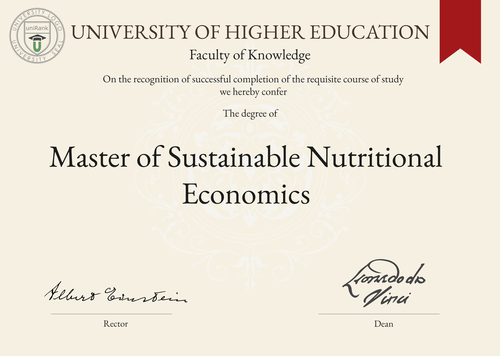
Master of Sustainable Nutritional Economics (M.S.N.E.)
Guide to Master of Sustainable Nutritional Economics Program/Course/Degree
Master of Sustainable Nutritional Economics (M.S.N.E.)

Program Name:
Master of Sustainable Nutritional EconomicsProgram or Degree abbreviation:
M.S.N.E.Duration range:
Varies by country and university (typically 1-2 years)Tuition range:
Varies by country and university (typically $10,000-$30,000 per year)Overview:
The Master of Sustainable Nutritional Economics program is designed to provide students with a comprehensive understanding of the economic aspects of sustainable nutrition. This interdisciplinary program combines principles of economics, nutrition and sustainability to address the global challenges related to food production, consumption and distribution.Curriculum Overview by year:
- Year 1: - Introduction to Sustainable Nutrition - Microeconomics for Food Systems - Macroeconomics for Sustainable Development - Food Policy and Governance - Research Methods in Nutritional Economics - Year 2: - Agricultural Economics and Sustainable Food Production - Food Security and Poverty Alleviation - Sustainable Food Marketing and Consumer Behavior - Sustainable Food Systems Planning and Management - Thesis or Capstone ProjectKey Components:
- Economic analysis of food systems - Sustainable agriculture and food production - Food policy and governance - Food security and poverty alleviation - Sustainable food marketing and consumer behaviorCareer Prospects:
Graduates of the Master of Sustainable Nutritional Economics program can pursue various career paths in both public and private sectors. Potential career options include: - Food policy analyst - Sustainable agriculture consultant - Food systems planner - Research economist - Non-profit organization managerSalary Expectations:
Salary expectations for graduates of the Master of Sustainable Nutritional Economics program can vary depending on factors such as location, industry and job position. On average, professionals in this field can earn a salary ranging from $50,000 to $80,000 per year. For a more accurate understanding of salary expectations, you can utilize the Job Sites Search Engine, from our sister site jobRank, which searches over 4,600 job sites worldwide. Make sure to specify not only the job title but also the country you are interested in.Conclusions:
It is important to note that the duration, tuition fees, curriculum, key components, career prospects and salary expectations of the Master of Sustainable Nutritional Economics program can vary depending on the chosen country or location of study, as well as the chosen university. Prospective students are encouraged to research and compare different programs and universities to find the best fit for their academic and career goals. Visitors can search for where this specific degree, Master of Sustainable Nutritional Economics, is offered anywhere in the world through the uniRank World Universities Search Engine.World Universities Search Engine
search for Master of Sustainable Nutritional Economics (M.S.N.E.) and add the Location (country, state etc.) or specific University you are interested in studying at.
Query examples:
- Master of Sustainable Nutritional Economics (M.S.N.E.) United States
- Master of Sustainable Nutritional Economics (M.S.N.E.) United Kingdom online
- Master of Sustainable Nutritional Economics (M.S.N.E.) Australia international students
- Master of Sustainable Nutritional Economics (M.S.N.E.) University of California
- Master of Sustainable Nutritional Economics (M.S.N.E.) University of London tuition fees
- Master of Sustainable Nutritional Economics (M.S.N.E.) University of Sydney scholarships
Share Program/Course
Interesting? Share this program/course/degree info with your friends now.